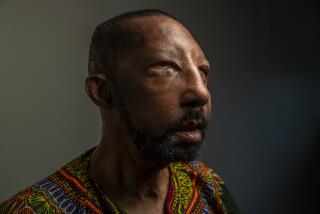Partial Face Transplant Was Necessary, Doctors Say
- Share via
French surgeons who performed the world’s first face transplant defended their use of the controversial technique, saying Friday that less radical plastic surgery procedures would not have worked.
The facial damage that occurred when the 38-year-old woman was mauled by her dog “was extremely difficult, if not impossible, to repair with classical techniques of surgery,” Dr. Jean-Michel Dubernard, with a Lyon hospital, said at a news conference in that city. “As doctors, if we have the possibility to improve [the condition of] our patient, that is what we do.”
Dr. Philippe Domy, director of the University Hospital Center in Amiens, where the procedure was performed Sunday, added, “We were in an exceptional situation that required an exceptional response.”
The transplant was approved by both university and national ethics committees, the surgical team said.
The patient “could no longer eat normally, she had great difficulty speaking, and there is no possibility with plastic surgery today to repair the muscles around the mouth which allow people to articulate when they speak and not spit out food when they eat,” said Dr. Carine Camby, director-general of the French Biomedicine Agency, which coordinates organ procurement.
Since the surgery, the patient has eaten strawberries and chocolate and drunk coffee and fruit juice, said Dr. Bernard Devauchelle of the Amiens hospital. He and Dubernard led the team that performed the surgery.
The patient also has been talking. “Her first words were ‘thank you,’ ” Devauchelle said.
The unidentified woman from Lille has been recovering without complications, the team said.
The woman, a mother of two teenage daughters, was mauled in May by her Labrador retriever mix when she accidentally stepped on the dog in the middle of the night. Although she did not blame the animal for the accident, the dog was euthanized. She since has obtained another dog, the team said.
Several research teams around the world, including Dubernard’s, have been gearing up to perform a face transplant, and the ethics have been vociferously debated.
Critics say the procedure could be psychologically disturbing not only to the patient, who literally would be wearing the face of another person, but also to family members of the donor, who may see their lost loved one in the recipient.
Experts note, however, that the overall structure of the face is controlled predominantly by the underlying bone structure of the skull, so any resemblance to the donor would be limited. In this case, moreover, only the chin, mouth and nose from the brain-dead donor were used, further limiting resemblance.
The transplant involved skin and underlying muscle, cartilage, fat, nerves and blood vessels from the female donor, chosen to match skin color and texture.
In the 15-hour procedure, the surgeons first cleaned up the recipient’s face, repairing minor damage to the bone and removing fibrous scars. The team then connected the donor blood vessels into the patient’s circulatory system, attached nerves and muscles, and then sewed in the lining of the nose and mouth.
“When we were finished ... we were all surprised because the immediate result was completely outside our expectations,” said Dr. Benoit Lengele of the Saint-Luc University Clinic in Brussels, who participated in the surgery.
There will be a very small scar around the outside of the graft, Lengele said, but most of the scars will be inside the mouth and nose.
Dubernard said the woman was receiving a mix of three immunosuppressive drugs and had shown no signs of rejecting the graft.
The team also gave her a transplant of bone marrow from the donor on the fourth day after surgery and will give her another one on the 11th day.
Dubernard said the bone marrow grafts, a procedure he had used with success in hand transplant surgery, help train the recipient’s body to recognize the new tissue, making rejection less likely. The woman, however, will have to take the transplant drugs for the rest of her life.
Associated Press was used in compiling this report.
More to Read
Sign up for Essential California
The most important California stories and recommendations in your inbox every morning.
You may occasionally receive promotional content from the Los Angeles Times.










